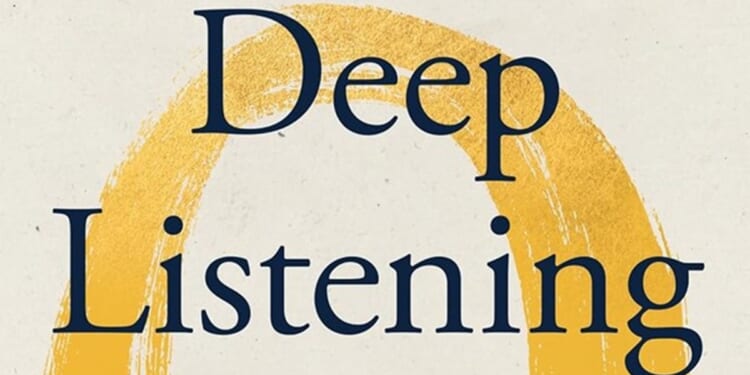BESIDES being the name of this book, Deep Listening is the title of an album by the avant-garde accordion player Pauline Oliveros — which was recoded in a cistern 14-feet underground. Oliveros saw Deep Listening as “going below the surface of what is heard” and “expanding to the whole field of sound”.
Emily Kasriel adopts Oliveros’s term to help give shape to an eight-step transformative listening process — human to human. Part-way through the book, she uses the phrase “intentional listening”, but, for her, Deep Listening is more than an intention: it is a practice that begins with self-listening and makes space for the other through curiosity, empathy, and respect, supportively holding the gaze and silence before feeding back and going yet deeper.
Deep Listening is informed by Kasriel’s experience as a coach and the therapeutic active listening of Carl Rogers, with Martin Buber’s I-Thou understanding of relationship in the background. Eschewing operational and transactional forms of listening, Kasriel presents a treasure store of wisdom that will benefit anyone with the ambition to be a better listener.
The book is carefully crafted and extremely reader-friendly. It conveys a powerful combination of warmth and restraint which suggests that Kasriel really does practise what she preaches. The many takeaway points are all summarised at the end of each chapter, which makes it easy to go back and remind yourself what seemed like a really good idea as you read it — and there are many.
But what about the premise? Is it really true that a better quality of listening can be transformative? Surely it is. I am convinced of this, simply because inept or insincere listening can be so depleting and destructive — for instance, if your listener has a strong preconception, is really thinking about something else, finds your revelations triggering, or is anxious or judgemental or busy looking over your shoulder to see whom else they might talk to. Deep Listening is the antidote to all that.
There is an implicit ethic in the book: Deep Listening is for the benefit of the listened-to. But I wonder whether there is a need to make it more explicit. Deep Listening also empowers the listener, and a skilled listener will encourage and facilitate vulnerability, on both sides. This, too, must be “held”, for listening to be authentic and effective, but that is not the end of it. Kasriel proposes eight steps, but I would want to add a ninth, “Let go.”
The Revd Dr Stephen Cherry is the Dean of Chapel at King’s College, Cambridge.
Deep Listening: Transform your relationships with family, friends and foes
Emily Kasriel
Thorsons £16.99
(978-0-00-865332-3)
Church Times Bookshop £15.29

















